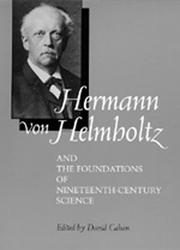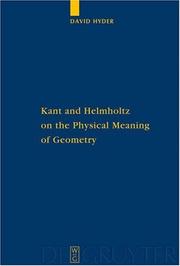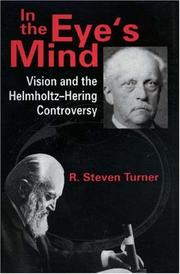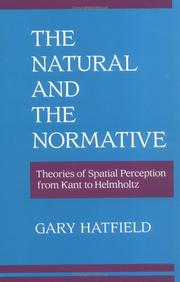| Listing 1 - 7 of 7 |
Sort by
|

ISBN: 9780226326597 0226326594 0226326586 Year: 1995 Publisher: Chicago London University of Chicago Press
Abstract | Keywords | Export | Availability | Bookmark
 Loading...
Loading...Choose an application
- Reference Manager
- EndNote
- RefWorks (Direct export to RefWorks)
Naturwissenschaften. --- Natuurwetenschappen. --- Philosophie des sciences --- Philosophy. --- Science --- Sciences --- Wetenschapsfilosofie. --- Wissenschaftsphilosophie. --- Philosophy --- History --- Social aspects --- Social aspects. --- Sociology. --- Aspect social --- Helmholtz, Hermann von, --- Helmholtz, Hermann von. --- Helmoltz, Hermann von, --- 1800-1899. --- 19th century

ISBN: 9786612356742 0520914090 1282356747 0585112894 9780520914094 9780585112893 9781282356740 0520083342 Year: 1993 Publisher: Berkeley University of California Press
Abstract | Keywords | Export | Availability | Bookmark
 Loading...
Loading...Choose an application
- Reference Manager
- EndNote
- RefWorks (Direct export to RefWorks)
Hermann von Helmholtz (1821-1894) was a polymath of dazzling intellectual range and energy. Renowned for his co-discovery of the second law of thermodynamics and his invention of the ophthalmoscope, Helmholtz also made many other contributions to physiology, physical theory, philosophy of science and mathematics, and aesthetic thought. During the late nineteenth century, Helmholtz was revered as a scientist-sage-much like Albert Einstein in this century.David Cahan has assembled an outstanding group of European and North American historians of science and philosophy for this intellectual biography of Helmholtz, the first ever to critically assess both his published and unpublished writings. It represents a significant contribution not only to Helmholtz scholarship but also to the history of nineteenth-century science and philosophy in general.
Science --- Scientists --- Physiologists --- Biologists --- Medical scientists --- History --- Helmholtz, Hermann von, --- Gelʹmgolʹt︠s︡, German Li︠u︡dvig Ferdinand, --- Von Helmholtz, Hermann, --- Helmholtz, H. --- Gelʹmgolʹtt︠s︡, German fon-, --- Fon-Gelʹmgolʹtt︠s︡, German, --- Helmholtz, Hermann Ludwig Ferdinand von, --- Helmholtz, Herman L. F., --- Helmholtz, Hermann von, -- 1821-1894.. --- Science -- History -- 19th century.. --- Scientists -- Germany -- Biography.. --- Physiologists -- Germany -- Biography. --- 19th century science. --- acoustics. --- aesthetics. --- chemistry. --- classicism. --- colors. --- electrodynamics. --- empiricism. --- experiment. --- eye. --- force. --- helmholtz. --- history of science. --- mathematics. --- medical community. --- natural laws. --- natural science. --- ophthalmoscope. --- perception. --- philosophy of science. --- physics. --- physiologists. --- science. --- scientific method. --- scientists. --- sound. --- space. --- theoretical physics. --- thermodynamics. --- tone. --- vision. --- visual perception. --- visual.

ISBN: 1282716727 9786612716720 3110217201 9783110217209 9781282716728 9783110183917 3110183919 311048157X Year: 2009 Publisher: Berlin New York Walter de Gruyter
Abstract | Keywords | Export | Availability | Bookmark
 Loading...
Loading...Choose an application
- Reference Manager
- EndNote
- RefWorks (Direct export to RefWorks)
This book offers a new interpretation of Hermann von Helmholtz's work on the epistemology of geometry. A detailed analysis of the philosophical arguments of Helmholtz's Erhaltung der Kraft shows that he took physical theories to be constrained by a regulative ideal. They must render nature "completely comprehensible", which implies that all physical magnitudes must be relations among empirically given phenomena. This conviction eventually forced Helmholtz to explain how geometry itself could be so construed. Hyder shows how Helmholtz answered this question by drawing on the theory of magnitudes developed in his research on the colour-space. He argues against the dominant interpretation of Helmholtz's work by suggesting that for the latter, it is less the inductive character of geometry that makes it empirical, and rather the regulative requirement that the system of natural science be empirically closed.
Geometry --- Mathematics --- Euclid's Elements --- Philosophy. --- Kant, Immanuel, --- Helmholtz, Hermann von, --- Gelʹmgolʹt︠s︡, German Li︠u︡dvig Ferdinand, --- Von Helmholtz, Hermann, --- Helmholtz, H. --- Gelʹmgolʹtt︠s︡, German fon-, --- Fon-Gelʹmgolʹtt︠s︡, German, --- Helmholtz, Hermann Ludwig Ferdinand von, --- Helmholtz, Herman L. F., --- Kant, Immanuel --- Kant, I. --- Kānt, ʻAmmānūʼīl, --- Kant, Immanouel, --- Kant, Immanuil, --- Kʻantʻŭ, --- Kant, --- Kant, Emmanuel, --- Ḳanṭ, ʻImanuʼel, --- Kant, E., --- Kant, Emanuel, --- Cantơ, I., --- Kant, Emanuele, --- Kant, Im. --- קאנט --- קאנט, א. --- קאנט, עמנואל --- קאנט, עמנואל, --- קאנט, ע. --- קנט --- קנט, עמנואל --- קנט, עמנואל, --- كانت ، ايمانوئل --- كنت، إمانويل، --- カントイマニユエル, --- Kangde, --- 康德, --- Kanṭ, Īmānwīl, --- كانط، إيمانويل --- Kant, Manuel, --- Helmholtz, Hermann von. --- Kant, Immanuel. --- philosophy of science.
Book
ISBN: 9781139516785 1139516787 9781139057745 113905774X 9781139518642 113951864X 9781107015173 1107015170 1107230128 9781107230125 1139508091 9781139508094 1283521741 9781283521741 1139517716 9781139517713 9786613834195 661383419X 1139515136 9781139515139 1139514210 9781139514217 9781107504332 1107504333 Year: 2012 Publisher: Cambridge ; New York : Cambridge University Press,
Abstract | Keywords | Export | Availability | Bookmark
 Loading...
Loading...Choose an application
- Reference Manager
- EndNote
- RefWorks (Direct export to RefWorks)
The musical writings of scientist Hermann von Helmholtz (1821-94) have long been considered epoch-making in the histories of both science and aesthetics. Widely regarded as having promised an authoritative scientific foundation for harmonic practice, Helmholtz can also be read as posing a series of persistent challenges to our understanding of the musical listener. Helmholtz was at the forefront of sweeping changes in discourse about human perception. His interrogation of the physiology of hearing threw notions of the self-possessed listener into doubt and conjured a sense of vulnerability to mechanistic forces and fragmentary experience. Yet this new image of the listener was simultaneously caught up in wider projects of discipline, education and liberal reform. Reading Helmholtz in conjunction with a range of his intellectual sources and heirs, from Goethe to Max Weber to George Bernard Shaw, Steege explores the significance of Helmholtz's listener as an emblem of a broader cultural modernity.
Music --- Musical acoustics --- Physics --- Sound --- Monochord --- Music physiology --- Physiological aspects of music --- Music psychology --- Psychological aspects. --- Physiological aspects. --- Acoustics and physics. --- Psychology --- Helmholtz, Hermann von, --- Gelʹmgolʹt︠s︡, German Li︠u︡dvig Ferdinand, --- Von Helmholtz, Hermann, --- Helmholtz, H. --- Gelʹmgolʹtt︠s︡, German fon-, --- Fon-Gelʹmgolʹtt︠s︡, German, --- Helmholtz, Hermann Ludwig Ferdinand von, --- Helmholtz, Herman L. F.,
Book
ISBN: 9780262363839 0262363836 9780262045735 0262045737 0262363844 Year: 2021 Publisher: Cambridge, MA : The MIT Press
Abstract | Keywords | Export | Availability | Bookmark
 Loading...
Loading...Choose an application
- Reference Manager
- EndNote
- RefWorks (Direct export to RefWorks)
"Exhaustive history of Helmholtz's work on the conservation of energy and its broad acceptance"--
Force and energy --- Physicists --- History. --- Helmholtz, Hermann von, --- Physical scientists --- Conservation of energy --- Correlation of forces --- Energy --- Physics --- Dynamics --- Gelʹmgolʹt︠s︡, German Li︠u︡dvig Ferdinand, --- Von Helmholtz, Hermann, --- Helmholtz, H. --- Gelʹmgolʹtt︠s︡, German fon-, --- Fon-Gelʹmgolʹtt︠s︡, German, --- Helmholtz, Hermann Ludwig Ferdinand von, --- Helmholtz, Herman L. F., --- Criticism and interpretation.

ISBN: 0691033978 1306984785 069160276X 1400863813 9781400863815 9780691033976 9780691602769 Year: 1994 Publisher: Princeton, N. J. Princeton University Press
Abstract | Keywords | Export | Availability | Bookmark
 Loading...
Loading...Choose an application
- Reference Manager
- EndNote
- RefWorks (Direct export to RefWorks)
One of the most persistent controversies of modern science has dealt with human visual perception. It erupted in Germany during the 1860s as a dispute between physiologists Hermann von Helmholtz, Ewald Hering, and their schools. Well into the twentieth century these groups warred over the origins of our capacity to perceive space, over the retinal mechanisms that mediate color sensations, and over the role of mind, experience, and inference in vision. Here R. Steven Turner explores the impassioned exchanges of those rival schools, both to illuminate the clash of theory and to explore the larger role of controversy in the development of science. Controversy, he suggests, is constitutive of scientific change, and he uses the Helmholtz-Hering dispute to illustrate how polemics and tacit negotiation shape evolving theoretical stances.Turner focuses on the arguments and issues of the dispute, issues that ranged from the interpretation of color blindness and optical illusions to the therapeutic practices of clinical ophthalmology. As well, he focuses on the personalities, institutions, disciplinary structures, and methodological commitments that shaped the dispute, including the schools' rhetorical strategies. He explores the incommensurability of the protagonists' viewpoints and examines the reception of the theories and the changing fortunes of the schools. Finally, Turner traces the controversy into the twentieth century, where the issues continue to inform the study of vision today.Originally published in 1994.The Princeton Legacy Library uses the latest print-on-demand technology to again make available previously out-of-print books from the distinguished backlist of Princeton University Press. These editions preserve the original texts of these important books while presenting them in durable paperback and hardcover editions. The goal of the Princeton Legacy Library is to vastly increase access to the rich scholarly heritage found in the thousands of books published by Princeton University Press since its founding in 1905.
Visual perception --- Research --- Vision --- Visual Perception. --- History --- 19th century. --- history. --- physiology. --- -Optics, Psychological --- Perception --- Visual discrimination --- -19th century --- Psychological aspects --- Helmholtz, Hermann von --- Hering, Ewald --- -History --- History. --- Physiology. --- Helmholtz, Hermann von, --- Hering, Ewald, --- Optics, Psychological --- Hering, E. --- Hering, Karl Ewald Konstantin, --- Gelʹmgolʹt︠s︡, German Li︠u︡dvig Ferdinand, --- Von Helmholtz, Hermann, --- Helmholtz, H. --- Gelʹmgolʹtt︠s︡, German fon-, --- Fon-Gelʹmgolʹtt︠s︡, German, --- Helmholtz, Hermann Ludwig Ferdinand von, --- Helmholtz, Herman L. F., --- Perception, Visual --- Perceptions, Visual --- Visual Perceptions --- Vision, Ocular --- Light Signal Transduction, Visual --- Ocular Vision --- Visual Light Signal Transduction --- Visual Phototransduction --- Visual Transduction --- Phototransduction, Visual --- Transduction, Visual --- Eye --- Ophthalmology --- Visual Perception --- 19th century --- Visual perception - History - 19th century. --- History&delete& --- Eyesight --- Seeing --- Sight --- Senses and sensation --- Blindfolds --- Physiological optics

ISBN: 0262080869 0262515350 0262275058 0585210349 9780262275057 9780585210346 9780262080866 9780262515351 Year: 1990 Publisher: Cambridge (Mass.): MIT Press,
Abstract | Keywords | Export | Availability | Bookmark
 Loading...
Loading...Choose an application
- Reference Manager
- EndNote
- RefWorks (Direct export to RefWorks)
Philosophy --- Space perception --- Perception spatiale --- History --- Histoire --- Helmholtz, Hermann von, --- Kant, Immanuel, --- History. --- Space Perception. --- -Spatial perception --- Perception --- Spatial behavior --- Figure-ground perception --- Geographical perception --- Perception, Space --- Perceptions, Space --- Space Perceptions --- Spatial Learning --- Philosophical Overview --- Hedonism --- Stoicism --- Overview, Philosophical --- Overviews, Philosophical --- Philosophical Overviews --- Philosophies --- Space Perception --- Humanities --- Visual Perception --- Mental Processes --- Psychological Phenomena and Processes --- Psychiatry and Psychology --- Psychology --- Social Sciences --- -History --- -Perception, Space --- Spatial perception --- Human Information Processing --- Information Processing, Human --- Perception, Visual --- Perceptions, Visual --- Visual Perceptions --- Perceptions --- Psychologic Processes and Principles --- Philosophy. --- Vision, Ocular --- Sensation --- Pharmacy Philosophy --- Pharmacy Philosophies --- Philosophies, Pharmacy --- Philosophy, Pharmacy --- Psychologic Processes --- Psychological Processes --- Phenomena, Psychological --- Processes, Psychologic --- Processes, Psychological --- Psychological Phenomenas --- Psychological Processe --- Cognitive psychology --- Gelʹmgolʹt︠s︡, German Li︠u︡dvig Ferdinand, --- Von Helmholtz, Hermann, --- Helmholtz, H. --- Gelʹmgolʹtt︠s︡, German fon-, --- Fon-Gelʹmgolʹtt︠s︡, German, --- Helmholtz, Hermann Ludwig Ferdinand von, --- Helmholtz, Herman L. F., --- Kant, Immanuel --- Kant, I. --- Kānt, ʻAmmānūʼīl, --- Kant, Immanouel, --- Kant, Immanuil, --- Kʻantʻŭ, --- Kant, --- Kant, Emmanuel, --- Ḳanṭ, ʻImanuʼel, --- Kant, E., --- Kant, Emanuel, --- Cantơ, I., --- Kant, Emanuele, --- Kant, Im. --- קאנט --- קאנט, א. --- קאנט, עמנואל --- קאנט, עמנואל, --- קאנט, ע. --- קנט --- קנט, עמנואל --- קנט, עמנואל, --- كانت ، ايمانوئل --- كنت، إمانويل، --- カントイマニユエル, --- Kangde, --- 康德, --- Kanṭ, Īmānwīl, --- كانط، إيمانويل --- Kant, Manuel, --- Space perception - History.
| Listing 1 - 7 of 7 |
Sort by
|

 Search
Search Feedback
Feedback About UniCat
About UniCat  Help
Help News
News